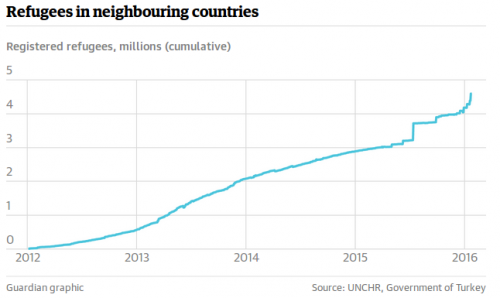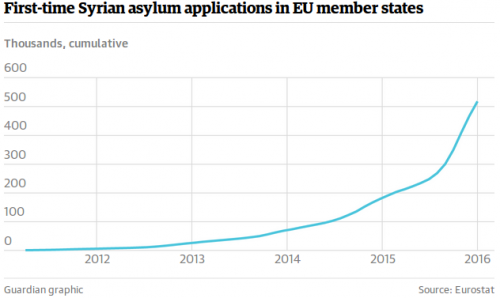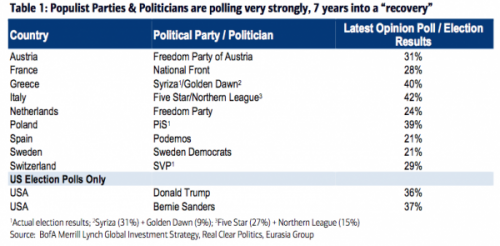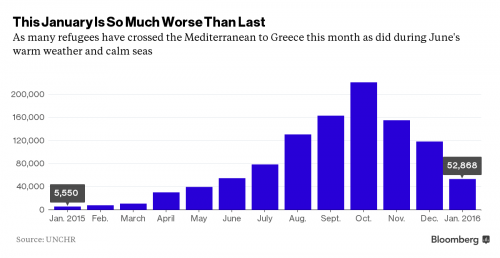Europe's refugee crisis approaching breaking point
Leipzig's police chief, Bernd Merbitz, had a very disturbing thing to say in a newspaper interview.
."I am really very concerned. We are heading to a situation in which instigators who are ready for violence deliberately use the fears of people to stir up hysteria against the asylum policy and justify violence against refugees." Throughout the region, according to Merbitz, "there is a pogrom mood, which is acquiring an extremely dangerous intensity."
Pogrom is not a word to be taken lightly.
To see how this might play out, consider what happened last week in Stocholm.
A mob of black-clad masked men went on a rampage in and around Stockholm's main train station last night beating up refugees and anyone who did not look like they were ethnically Swedish.
Before the attack, the group of 200 people handed out xenophobic leaflets with the message 'Enough now'.
Swedish media reported that the thugs, allegedly linked to Sweden's football hooligan scene, were targeting unaccompanied minors with a 'foreign' background.
Refugees in Russia have gotten similar treatment.

It wasn't hard to predict this sort of reaction. At no time in history has there been a nation that was suddenly inundated with refugees of a different religion or ethnicity and there wasn't a violent backlash. However, if you think that the backlash against the refugees was all about a few thugs, think again.
(Reuters) - Denmark's parliament passed measures on Tuesday aimed at deterring refugees from seeking asylum, including confiscating valuables to pay for their stay, despite protests from international human rights organizations.
Under the bill, refugees could keep possessions amounting to 10,000 Danish crowns ($1,450), raised from 3,000 crowns after criticism from human rights organizations. Valuables of special emotional value such as wedding rings will be exempt.
So Denmark is going to steal from refugees. Where would they get such a disgusting idea? From most of the rest of Europe. Here are a few examples:
Authorities in Switzerland have begun warning refugees that they will have to hand over any property worth more than 1,000 Swiss francs ($980).
Some states in southern Germany have begun seizing assets from refugees if they are worth more than 750 euros ($812).
The U.N. human rights chief has accused the Czech Republic of taking refugees' money to pay for their detention. In some cases, the refugees have been strip-searched in a bid to find cash.
In Britain, refugees in one city were made to wear red wristbands in order to receive food.
Norway forced some refugees to cycle across the border to Russia in the dead of winter.
Slovakia has said that it will refuse entry to Muslim refugees, instead announcing that it would take in only Christians.

This is just the start. All over Europe populist parties are rising fast in the polls along with outrage at the huge wave of refugees, and elections will be happening under that environment.

Already Germany has told Afghanistan to stop sending us refugees or we'll stop sending you aid money.
Europe is blaming Greece for all the refugees. In fact, the pressure on Greece to act is what I would call monstrous.
Last week the European Commission mulled quarantining Greece by building a razor-wire fence inside the Former Yugoslav Republic of Macedonia, which is not even a member of the EU. German sources floated the idea of cancelling Greece’s debt if only Greece would agree to jail 400,000 migrants. A Belgian minister, in an EU negotiation, is alleged – by his Greek counterpart – to have demanded the Greeks “push back or sink” the boats coming from Turkey, in breach of international law. Others in Europe are proposing to criminalise the NGOs that are helping the refugees as they arrive in the islands.
Ultimately this official and unofficial backlash will have a single conclusion - the end of the Schengen borderless Europe and the end of the idea of a united Europe.
It is a remarkable achievement. You could get into your car in Portugal and drive all the way to Finland via Spain, France, Germany, Poland, Lithuania, Latvia and Estonia without ever once having to show a passport or identity card. Or rather, that was the situation until last month, when Germany, Denmark, Sweden and Austria re-imposed passport checks at their borders, ports and airports even for travelers arriving from other Schengen Zone countries. France acted even earlier, declaring emergency controls on its borders after the terrorist massacre in Paris in November. So now fully half of the EU’s citizens (counting the UK and Ireland) live behind real borders again.
The border controls are supposed to be temporary, but the refugee crisis isn't going away anytime soon. In fact, it could get a lot worse, which is not something that Europe's now fragile political environment can handle.

Eventhough countries like Germany, which alone took in 1.1 million refugees just last year, it could be a drop in the bucket for several reasons.
#1) The refugee camps in places like Lebanon and Jordan are bursting.
"Sooner or later, I think, the dam is going to burst," King Abdullah of Jordan told the BBC. He said his country is housing more than a million Syrians, many of whom came after the 2011 civil war in Syria broke out. Up to 100 new refugees are admitted each day, the network reports.
Jordan's welcoming nature has to stop, he said. "We can't do it anymore."
King Abdullah told the BBC up to 25% of his country's budget goes to helping migrants and finding jobs for them.
#2) The wars keep getting worse.
A dramatic breakthrough of the rebel lines by the Syrian government near Aleppo has caused 70,000 people to flee for the Turkish border.
Soon the west will be bombing Libya again.
Afghanistan is "teetering on the brink of failure."
The big war danger, the one everyone should be scared of, is this one.
The Russian military said Thursday that it has “reasonable grounds” to suspect that Turkey is making intensive preparations for a military invasion of neighboring Syria.
Images of a checkpoint on the border between the Turkish town of Reyhanli and the town of Sarmada in Syrian taken in late October and late January show a buildup of transportation infrastructure that could be used for moving in troops, ammunition and weapons, spokesman Maj. Gen. Igor Konashenkov said in an English-language written statement.
Turkey is already in a low grade civil war. An invasion of Syria to prop up it's rebel proxies could turn Syria into a regional war.
#3) Then there is the danger that few are paying attention to - low oil prices.
Specifically in Iraq.
Ali Khedery, the CEO of Dubai-based Dragoman Partners, a former adviser to US Central Command, and a former Exxon executive with extensive on-the-ground experience in Iraq, warned that cheap oil threatens the country's last remaining semblance of order.
"You are looking at a significant possibility of state collapse due to civil unrest," he told Business Insider.
It isn't just Iraq. Africa will be the epicenter of this.
Nigeria, its largest economy, could be knocked to its knees. Oil production is stalling, and unemployment is expected to skyrocket. ...
Today, Angola’s economy is grinding to a halt. Construction companies cannot pay their workers. The cash-strapped government is slashing the subsidies that large numbers of Angolans depend on, fueling popular anger and a sense that the petro-boom enriched only the elite, leaving everyone else worse off.
What has to be done
The first thing to do is to face the fact that refugees are a symptom, not the source of the problem.
Therefore, fixing the anti-refugee backlash doesn't fix anything. If you want to fix something then focus on stopping the wars.
Europe, and the United States in particular, needs to put pressure on Turkey, Iran, the governments of Damascus and Baghdad, and the Gulf states to stop looking for a military solution (i.e. "victory") and start looking for a political solution (i.e. "peace"). Everyone has a grievance at this point. Unless we recognize those grievances and try to resolve them then we are headed for disaster.
People don't want to be refugees in the first place.

